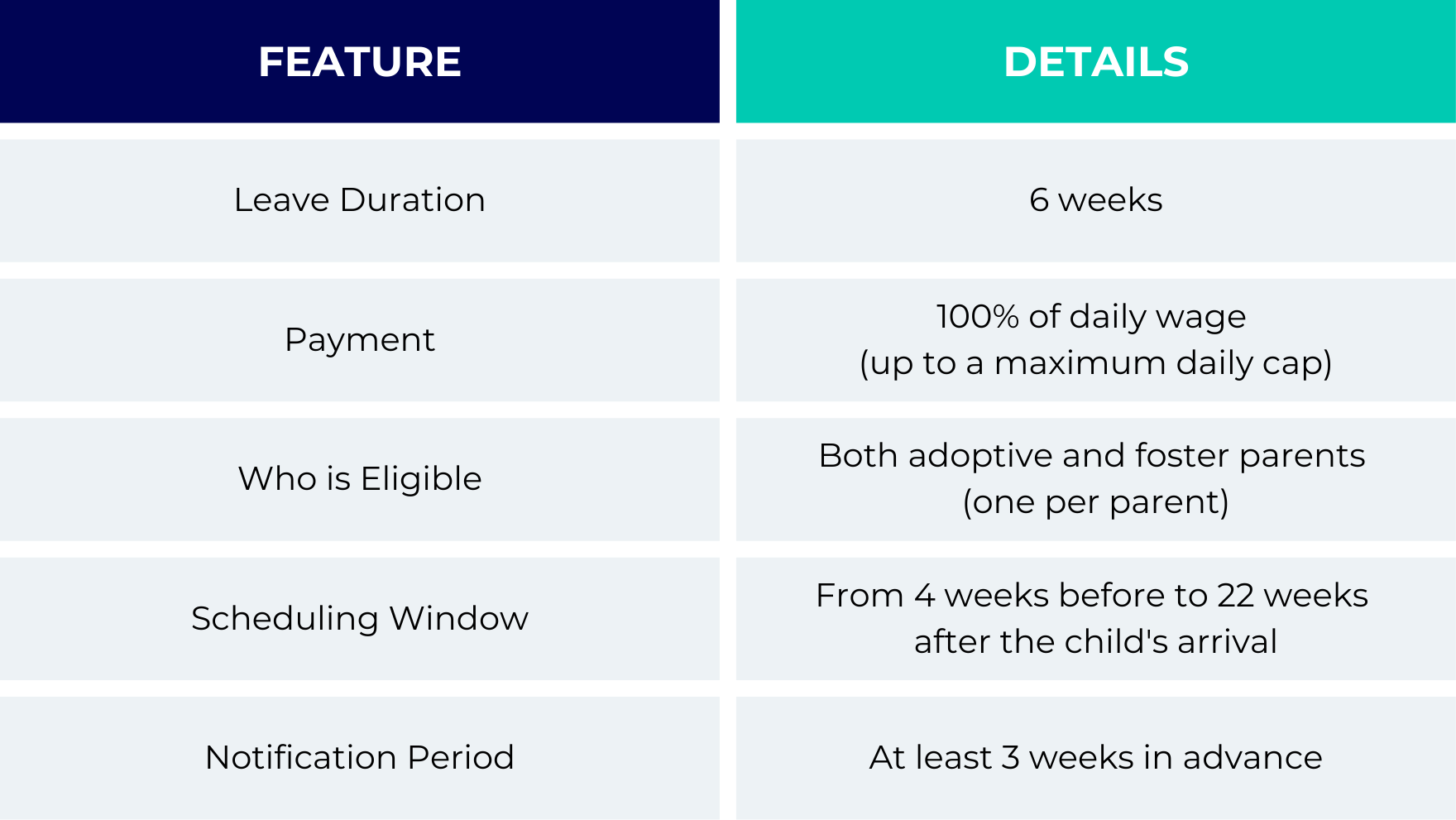24 juli 2025
Parental leave in the Netherlands: rights and employer responsibilities
When hiring employees in the Netherlands, understanding maternity, paternity, and parental leave obligations is crucial, not just for legal compliance but also for building a supportive workplace culture. Dutch law provides generous parental leave entitlements, and employers play a key role in ensuring that the process runs smoothly.
This guide will walk you through each type of family-related leave, what’s expected of you as an employer, and how a Dutch Employer of Record (EOR) can help you stay compliant, even without a local entity.
Maternity leave: duration, pay, and employer duties
Since January 2025, the Netherlands still ensures strong maternity protections, with 16 weeks of paid leave available, and now extended to 20 weeks for multiple births. This break is divided between pregnancy leave (typically 4-6 weeks beforehand, 10 weeks after birth). A crucial update commencing in 2025: employers must also provide a suitable, lockable space for breastfeeding employees for up to nine months post-birth, a requirement under new regulations to support maternal health.
Partners benefit from a total of six weeks of partner leave: one fully paid week to be taken within four weeks of birth, and up to five additional weeks paid at 70% of daily wage via UWV, now structured to offer greater scheduling flexibility and payroll coordination. Meanwhile, unpaid parental leave remains an option, with the first nine weeks compensated at 70% if taken within the first year.
Employers should be aware of several key 2025 changes: the maximum daily benefit cap is updated to €290.67, and stricter enforcement of misclassification and IND-related compliance is in effect. Public leaves such as bereavement and caregiving are evolving, with potential additions ahead to broaden emergency and caretaker leave.
Maintaining compliance means preparing payroll systems to integrate UWV reimbursements accurately, ensuring breastfeeding facilities, and staying ahead of future legislative reforms, especially around misclassification and the 30% ruling adjustments expected by 2027.
Paternity and partner leave (geboorteverlof) explained
Dutch law entitles partners to a minimum of one week of fully paid leave immediately following the child’s birth. Employers cover this cost directly through payroll. Additionally, partners may take up to five more weeks of “partnerverlof,” which is paid at 70% of their salary by the UWV (capped at a daily maximum). This extended leave must be taken within six months of birth.
Employers must:
- Adjust payroll to cover the initial week of leave.
- Inform UWV of any applications for partnerverlof.
- Ensure that partner privileges are clearly outlined in employment contracts.
While these responsibilities are manageable, they can become complex, especially if your company employs multiple remote or part-time workers.
Parental leave (ouderschapsverlof): what’s available and how it works
After completing maternity and partner leave, employees in the Netherlands are entitled to up to 26 weeks of parental leave per parent, per child. Of this, nine weeks are partially paid at 70% of the employee’s daily wage, with compensation provided through the UWV (Employee Insurance Agency). The remaining 17 weeks are unpaid but still count as protected leave, meaning employers must process and track it correctly within HR and payroll systems.
Parental leave can be taken flexibly, either in full or spread across daily or weekly periods, as long as the paid portion is used within the first year of the child’s life. Employers must approve these arrangements in good faith, based on reasonable business considerations. Proper record-keeping, shift planning, and payroll coordination are critical to avoid errors and ensure compliance with Dutch labour law. Failing to manage leave entitlements correctly could result in fines or disputes.
Employer responsibilities and compliance obligations
Managing family leave in the Netherlands isn’t just a legal necessity—it’s a detailed administrative process. Employers must:
- Provide written employment contracts outlining statutory leave entitlements and procedures.
- Handle payroll correctly so salary adjustments are accurate during leave.
- Proactively communicate with UWV for reimbursement and leave authorisations.
- Keep thorough documentation of leave periods, dates, and correspondence.
- Adhere to the Dutch Civil Code and any relevant collective labour agreements (CAOs).
Failure to comply, such as making errors in payroll, missing deadline notifications, or violating job protection, can lead to fines or legal claims.
Adoption and foster care leave
For employees in the Netherlands welcoming a child through adoption or foster care, Dutch labour law provides specific leave entitlements to help your family bond and adjust. This adoption and foster care leave is a statutory right, and it’s designed to offer meaningful time off during this significant life event.
If you adopt a child or become a foster parent, you are entitled to a maximum of six weeks of paid leave. This entitlement applies to both parents, recognising that each parent needs time to welcome the child into their home and life.
Furthermore, the leave is paid at 100% of your salary, based on your daily wage, and is funded through the Employee Insurance Agency (UWV). It is important to know that this payment is subject to a maximum daily wage cap.
Key features
A key feature of this leave is its flexibility. You are not required to take all six weeks in one continuous block. The law allows you to spread the leave over a longer period. Hence, it offers the ability to schedule it between four weeks before the child’s arrival and up to 22 weeks after the child has joined your family. This flexibility can be invaluable for managing the practical and emotional logistics of an adoption or foster placement.
However, the process requires you to plan ahead. You must request this leave from your employer at least three weeks in advance. Additionally, your employer cannot refuse your request for adoption and foster care leave unless granting it would cause serious operational problems for the business.
As with other types of statutory leave, your holiday hours continue to accrue while you are on adoption or foster care leave, and your pension accrual is not affected.
The following table summarises the key features of adoption and foster care leave in the Netherlands:
How a Dutch Employer of Record helps manage leave compliance
If you’re hiring in the Netherlands without establishing a local entity, navigating these obligations can feel daunting. A Dutch Employer of Record (EOR) offers a compliant, streamlined solution:
- Legal employer role: the EOR hires your staff under compliant Dutch contracts.
- Leave coordination with UWV: they manage applications for maternity and partner leave, and track partial payments.
- Payroll accuracy: salary and payslip adjustments are handled automatically during leave periods.
- CAO adherence: the EOR ensures contracts and benefits meet sector-specific collective agreements.
- Full documentation: they keep all records, approvals, and employee communications on file.
A UK-based biotech company hired a remote clinical researcher in Amsterdam but didn’t have a legal entity in the Netherlands. When the employee requested parental leave, the startup turned to a Dutch Employer of Record for support.
The EOR ensured the employee received the full nine weeks of paid parental leave, coordinating with the UWV to process the benefit at 70% of the employee’s daily wage. They managed leave tracking, handled payroll adjustments, and updated the employment contract in line with Dutch labour law.
Thanks to the EOR, the startup stayed fully compliant without needing local legal infrastructure, yet while the employee felt supported and secure in taking their entitled leave.
Partnering with a Dutch EOR means you stay fully compliant, without setting up an entity or maintaining local administrative resources.
Employer of Record can help with managing maternity leave
The Netherlands offers robust family leave protections, 16 weeks’ maternity leave, partner leave options, and 26 weeks of parental leave. Each comes with clear employer responsibilities around documentation, payroll, and benefits. Failing to meet these obligations can be costly, both financially and reputationally.
If you’re hiring Dutch staff without an established local operation, a Dutch Employer of Record can handle leave compliance, payroll, and contracts, allowing you to focus on growing your team confidently and legally.
Looking to hire in the Netherlands and ensure full compliance with parental leave and payroll obligations? Contact us to explore how our Dutch Employer of Record can support you seamlessly, no local entity required.

Frequently asked questions
What is the difference between maternity and parental leave?
Maternity leave is for the birth mother, offering 16 weeks of fully paid leave around childbirth. On the other hand, parental leave is available to both parents until the child is 8. This offers 26 weeks of unpaid leave per child, with 9 weeks paid at 70% if taken in the first year.
How much paternity leave is a partner entitled to?
Partners are entitled to 1 week of fully paid leave within the first 4 weeks after the birth. They can also take 5 additional weeks of paid leave at 70% of their salary within the first 6 months.
What is a parental leave?
Parental leave in the Netherlands allows parents to take unpaid time off to care for their young children. Each parent is entitled to 26 weeks of leave per child, which can be used anytime before the child’s 8th birthday.
Is maternity leave in the Netherlands fully paid?
Yes, maternity leave in the Netherlands is fully paid. Employees receive 100% of their daily wage for the total 16-week period of pregnancy and maternity leave, though this payment is subject to a statutory maximum daily cap.
Can my employer refuse my request for parental leave?
Your employer cannot refuse standard parental leave but can ask you to reschedule it if your absence would cause serious operational problems for the business. The initial 9 weeks of paid parental leave must be taken in the child’s first year.
Are international workers entitled to Dutch parental leave?
Your entitlement depends on where you are socially insured. If you are insured under the Dutch system, you are entitled to leave. If not, local rules of the country where you work and live apply.
This article was published in March 2023 and updated in December 2025.
